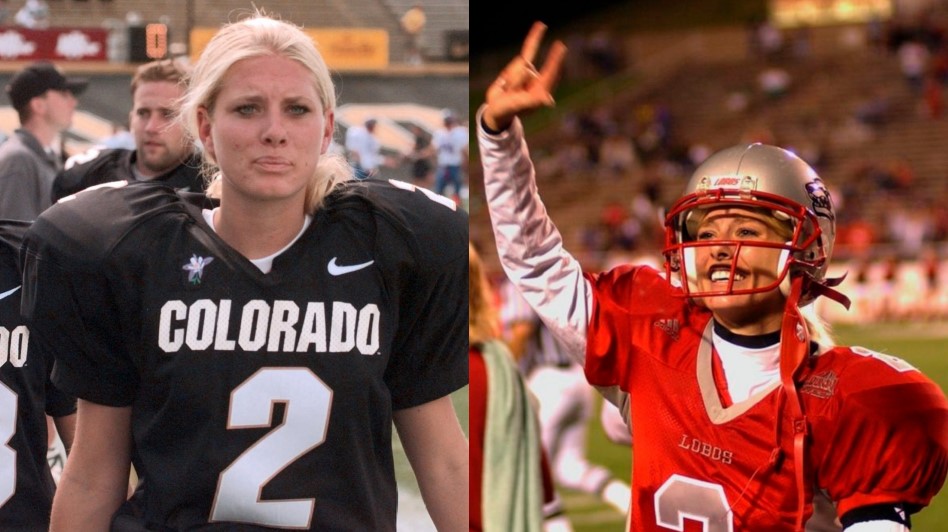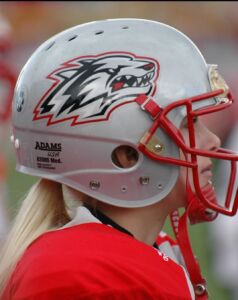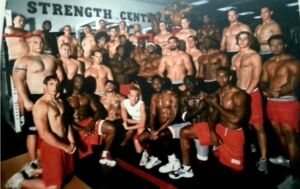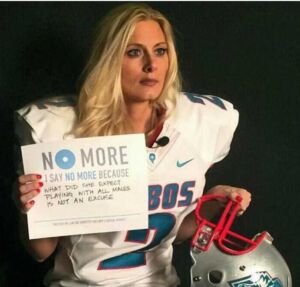Women can play football: Katie Hnida paved the way for athletes like Sarah Fuller
Colorado native and former Lobo kicker, Katie Hnida had an ugly experience at CU. Professionally, she wants to start the conversation surrounding sexual harassment in sports.
By Lauren Irwin

The rain was pouring down, drenching the New Mexico crowd. They were up by double digits and the blocked kick from last season crossed her mind until a tap on the shoulder changed it all. For Katie Hnida, it only took 1.3 seconds to make history.
In 2002, Hnida became the first woman to score a point in a Division One college football game. Her journey to that soaked field in Albuquerque didn’t begin with the referee’s whistle but in the backyard of Colorado suburbia, and her story was long from over.
Breaking Glass Ceilings and Cement Walls
The soccer-star-turned-Chatfield-High-kicker always was a football fan. Hnida says she grew up rooting for the Broncos and the Buffs, two Colorado teams with high performing seasons in the late 80s and early 90s. Hnida experienced a quad injury before high school, keeping her off the soccer field and in the backyard with her dad and brother, where Hnida realized she could still kick.
“I ended up propping [the ball] up, gave it a boot and it went flying over my dad’s head,” she says. “He cracked a joke that if maybe I couldn’t play soccer, I could be a football kicker. Little did he know, he planted this seed in my head.”
Hnida made her way through the ranks, kicking on the varsity team by her freshman year. A year later, she had the opportunity to kick in front of the Buffs’ former head coach Rick Neuhiesel in the spring game family activities on Folsom Field. She remembers Neuheisel joking about having scholarship papers in his office and to keep in touch once she graduated.
“And then he did keep in touch,” Hnida says. “I was enamored because I had grown up absolutely worshiping [the University of Colorado football] program.”
Hnida knew she wasn’t going to have an easy time in the program; not everyone was going to welcome a female onto a D1 football team with open arms. Yet, nothing could have prepared her for the extent of abuse she would endure.
The year was 1999 and it was the second time CU and CSU had faced off in the Rocky Mountain Showdown in years. CU was the foreseeable winner, but when they lost, beer bottles and trash rained down from the CSU fans at Mile High Stadium onto the players and staff, resulting in a stricter policy on alcohol sales—a decision that changed in 2018, when beer and wine sales came back to Folsom Field.
“It really was a welcome to the college football world,” she says.
In 1999, there was a new head coach, Gary Barnett, after Neuheisel accepted another position in Washington. Hnida remembers that it must have been a “black eye” for him to get a start like that since there was no way CU was supposed to lose to their Fort Collins-based rivals.
When the coaching turnover happened early in the year, Hnida didn’t know if Barnett would be as accepting as Neuheisel about having a woman on the team. She was right—he wasn’t.
While at CU, Hnida faced bullying and harassment from some teammates and staff. She knew they weren’t ecstatic about having her around, as she was a representation of change they couldn’t avoid. The predating masculine culture and tradition surrounding the sport was being altered by her presence, by a female’s athleticism. She felt like a burden, Hnida says.
“I had a handful of teammates—I always try to clarify that it was not all of my teammates—but I had a handful that really came after me and made my life a living hell,” Hnida says.
From verbal harassment to physical abuse, teammates called her names and threw footballs at her head. Some touched her inappropriately without consent and exposed themselves to her when coaches weren’t looking.
Hnida had so much on her plate that her mental and physical health began to fail. She suffered from infectious mononucleosis, also called “mono,” a sickness she says she caught early on and never got rid of until she left Boulder at the end of the school year.
She still tried to have a normal social life and foster new friendships. One evening, Hnida was hanging out with her teammate, someone she trusted and knew and considered a good friend. Then, Hnida was raped.
“I think that rape is a crime second only to murder. It is violent even when it’s not because it’s such a violation of your body, your mind and soul. It’s an awful thing,” she says.
In 2000, there was no #MeToo movement, and there was no dialogue or discourse about sexual harassment and assault. The conversation was completely different over 20 years ago, leaving many to feel isolated and unable to share what they had experienced.
“I didn’t know a single other person who had ever been raped,” Hnida says. “I didn’t know how to talk to my parents because I knew, too, that it was going to be so painful for them.”
When she arrived on campus in 1999, Hnida remembers they gave everyone rape whistles and talked about stranger rape, advising them on not walking alone at night and to keep an eye on your drink.
“That stuff is all important, but you’re much more likely to be raped by someone you know,” she says.
In a 2008 report by the Massachusetts Executive Office of Public Safety, they found that over 70% of women who were raped, were raped by someone they knew.
Similar to other survivors of rape and sexual assault, Hnida began experiencing panic attacks, flashbacks and nightmares, even after she transferred to a new school. After a hellish freshman year in Boulder, Hnida transferred to Santa Barbara City College for her sophomore year. There, she began the rebuilding process. She saw therapists and counselors and stayed in shape to enter the transfer pool to continue kicking in a D1 program.

“It was one of the worst years of my life, I was so depressed,” she says about her freshman year at CU. “But there was a part of me that still really loved football—kicking is my thing.”
The University of New Mexico was the last place Hnida thought she would end up, but after meeting the head coach, Rocky Long, in 2002, she knew the community in Albuquerque would respect her.

“He really emphasized that everyone in our program was important. From our athletic trainers to our equipment people who did our laundry, [we] were given the same amount of respect as our starting quarterback and the third-string linebacker,” Hnida says. “I have to be honest, it was almost stunning.”
From there, Hnida was just one with the team. They did everything together, she says.
The same team lobbied for Hnida to make history. During a rainy game against Texas State, the New Mexico Lobos were leading substantially. Hnida didn’t think she was going in after a devastating blocked kick in last season’s Las Vegas Bowl game. The men, however, rallied up the head coach, finally getting a yes to their question: Will Katie make history tonight?
Hnida did, in fact, make history that night as the first woman to score a point in a D1 college football game in August 2003.


“He is a gruff, tough man who you listen to and respect,” she says. “So the fact that my teammates went to bat for me was so special and indicative of how we worked. I was the one out there on the field, but it was all of us.”
Hnida quickly became one of the guys. They barbecued on weekends together and watched film and practiced during the week. They supported each other, something Hnida didn’t receive from her teammates in Boulder. Hnida says the culture of respect at UNM emanated from the head coach, but the teammates respected her dream just the same.
Hnida made a large impact on the UNM community, and she is still very much revered by the current coaching staff who were her teammates 20 years ago, says Frank Mercogliano, the assistant director of athletic communications at UMN.
“Katie proved to a lot of people that hard work and determination are the groundwork for success, and that any woman can break any glass ceiling placed in their way,” Mercogliano says. “I wasn’t here from 2002 to 2004 when she was here, but as the father of three daughters, I remember how cool my daughters thought it was that she was playing college football on such a big stage.”
Gender Violence in Popular Culture
While the Lobo men were and continue to be supportive of Hnida’s passion, female athletes still face an uphill battle towards equity in sports culture.
CU communication professor Jamie Skerski researches and teaches about language circulating in popular culture that influences how we think about gender. These classes, she says, wouldn’t have existed when Hnida was in Boulder; Skerski says only recently society has begun discussing gender in sports.
Both Hnida and Skerski know that sports, and specifically football and college football, are multi-billion dollar industries that reflect and produce culture, values and ideologies. Sports serve as a microcosm of society. In recent decades, sports has officially become a driving force in culture, as more people watched the Super Bowl this year than the Presidential Inauguration, NBC Sports and The Associated Press reported.
“From a communication perspective, thinking about the way sports language and metaphors are in our language everywhere, the primary metaphor we use to talk about sports is war,” Skerski says. “When that’s the driving metaphor for how we think about sports, that’s going to value certain kinds of competitions, athletes and sports over others.”
In the classroom, Skerski sees that students pick up on these metaphors and adopt them into their lives. Sports metaphors are also used to talk about sex and romance; there are trophy wives and players, having a roster of people you sleep with, Skerski says.
“In those metaphors, men are the agent,” says Skerski. “They are the ones that are winning or in competition and women are the objects to be competed for.”
In a university setting, it is important to look at the implications of these metaphors, especially in unique situations like Hnida’s. Skerksi says Barstool Sports’ slogan, “Saturdays are for the Boys,” is a phrase demonstrating how for many men, women do not belong in sports—even in viewership—because sports is a domain of men.
Over the past 20 years, universities like CU have stepped up their game on the Title IX front. Valerie Simons, the associate vice chancellor and Title IX coordinator at CU, notes how important the University’s role is in addressing sexual harassment in athletics. In addition to the mandatory all student and staff online testing, athletic teams are trained in-person to understand sexual misconduct policies.
According to the Office of Institutional Equity and Compliance (OIEC) at CU Boulder, 67% of sexual assaults happen to first-year students and 71% of those occurrences happened during the fall semester. Additionally, women in the LGBTQA+ community are reporting sexual assault more than straight women. Although, both are reporting that more than 90% of the time, they were assaulted by a man.
“The goal of Title IX is to remove barriers to eliminate discrimination on the basis of sex. We are really committed and passionate to making sure that is actually fulfilled on campus,” Simons says.
A student-run campaign sharing survivor statements on Instagram shows that many women who report sexual assault felt their needs were not met at the university level. Many of the anonymous statements claim that OIEC was respectful, but it was evident the University is a money-making institution. Not all students feel that the University is upholding their goal of eliminating barriers. However, some staff who have been in the Boulder community for over 20 years say there have been significant changes to the campus environment.
Many of the CU Boulder athletic staff from 1999 have left the University, but Dave Plati, the sports information director, remains. Plati, who joined the Buff community as a freshman in 1978, remembers Hnida’s struggles in 1999 and knew the Sports Information office next to the fieldhouse was a safe space for her. He recognizes the changes on campus over the last 20 years, noting the shift from mostly white men being in charge to now seeing turnover in many positions and efforts by the University to create a more inclusive environment.
“There are definitely more people of color—and women for that matter—in coaching and administrative positions than there were compared to 20 years ago,” he says. “Within time, women’s athletics would grow into a multi-million [dollar] operation with many things equal across the board, [including] recruiting budgets, travel, staff sizes and academic support.”
Skerski argues that not enough has changed. For example, some of the top performing professional women’s basketball teams are coached by men. No one questions a man’s ability to coach a women’s team, but we still question whether a woman could do that, Skerski says.
“[Women have] to work twice as hard to be taken half as seriously,” Skerski says in relation to sports and popular culture.
The sexism Hnida experienced throughout her career was not only on-the-field, but also through popular media, causing her to doubt herself. A 2002 article by the Los Angeles Times criticized Hnida’s athletic ability and diminished her dream.
“At the time it was so devastating because I had known since I was 14 that I wanted to play Division One football,” Hnida says. “The next day I woke up to the LA Times saying ‘Women shouldn’t play football, Katie Hnida just proved why,’ and I thought I just ruined this for everyone.”
The sexist criticism of female athletes in the media persists today, especially through social media. For every Tweet celebrating Sarah Fuller—a Vanderbuilt soccer player who stepped up in the fall 2020 season to kick for the football team—there were dozens of online trolls perpetuating that football still isn’t a place for women.
So, have things really changed over the past 20 years? Skerski says yes, but also no.
“Women’s sports have become more mainstream. We have little boys buying Alex Morgan jerseys; it’s cool now to be a girl dad, I don’t know why it wasn’t before, but there is momentum there,” she says. “It’s a reason to celebrate, but putting it into a larger context, if in almost 20 years the backlash [of Fuller] mirrors Katie’s experience, how much have we really improved?”
As the 50th anniversary of Title IX nears, it is important to look at the progress since then, and especially the ways we still need to improve. Women—whether they’re athletes, staff, coaches or reporters—are still sexualized in the sports industry.
“Just because women don’t run as fast or jump as high doesn’t mean that the game is any less important or interesting; there are other strengths women bring to the table,” Hnida says. “It doesn’t have to be a tunnel vision of how tough you are. There is so much more to it—the artistry and enjoying the game and what people are capable of doing with their bodies.”
Taking Her Power Back


Flashback to 2004, three CU alumni came forward about being raped by the same CU student. Hnida knew she needed to speak publicly about her experience after learning the other women’s cases were going to be dropped. Hnida says the University stood by the football team, sparking the attention of then-Governor Bill Owens and the State Grand Jury. By December 2004, a total of 10 women—including Hnida—revealed that they had been raped by CU football players. Two of the 10 women who came forward sued the school, which led to depositions where Hnida’s former role on the CU football team was discussed frequently.
“The school came after me hard, both the athletic department and some of the regents and even our president Betsy Hoffman,” Hnida recalls. “One of the guys on my team called me the C-word all the time. Somehow [Hoffman] got it twisted and said some people use that word as a term of endearment; that kind of summed up the way they were handling things.”
When Hnida came forward, she was still kicking for the Lobos, and the athletic department received hundreds of letters from women and men across the country who had been assaulted. Hnida says she still hasn’t opened them all because it was too emotionally overwhelming.
In 2004, people still had no one to look to after being sexually harassed or assaulted; Hnida provided that for people. Except when it happened to her, she had no one.
“I didn’t tell anyone right away that I was raped because I didn’t know I was,” she says. “I had spent this year being abused and bullied; I just didn’t know what to do. I had never experienced something like that in my life. I wanted to keep my head down, and meanwhile I was falling apart.”
Hnida didn’t let her rapist take her power. She overcame the challenges at CU, persevered through history-making kicks at UNM and now speaks publicly about sexual assault and harassment.
After UNM, she played some arena and semi-pro football. Today, she helps companies like Major League Baseball with entire-staff training on sexual misconduct and is an advocate in gender violence. She never expected that her experience could lead her into a professional life reaching younger girls, she says.
“I think people always think that I must hate CU so much and that’s not the case,” Hnida says. “I grew up loving the school and it was really devastating to go through what I went through, but you know, it’s been a long time and there are new people in the place. I think you have a great hire with Karl Dorrell. I wish your football team well.”
It took Hnida 1.3 seconds to make history. From snap, to hold, to kick, she proved that women do have a place on the football field and sexualization from men doesn’t make women any less powerful.
Hnida will be the first to tell you that her work is just getting started. She’s not done kicking and she’s not done fighting for women getting the opportunities they deserve.
“They talk about stuff being groundbreaking,” Hnida says. “It’s not a glass ceiling you shatter, it’s a damn cement wall.”


